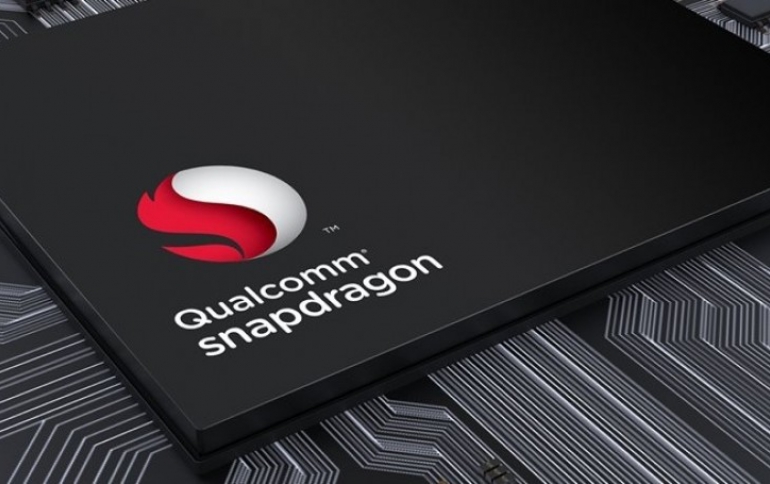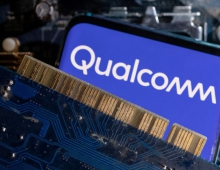
Qualcomm Introduces 64-Bit Smartphone Chipset with Integrated 4G LTE
Qualcomm said on Monday it will release the 64-bit Snapdragon 410 chipset with integrated 4G LTE functionality, designed for mobiles.
The new chipset will power smartphones that will be mainly released in emerging regions and in China. Built using the 28nm manufacturing process, the Snapdragon 410 chipsets feature processors that are 64-bit capable along with high-performing graphics powered by the Adreno 306 GPU. The chipsets support 1080p video playback and up to a 13 Megapixel camera. They also integrate 4G LTE and 3G cellular connectivity for all major modes and frequency bands across the globe and include support for Dual and Triple SIM. Together with Qualcomm RF360 Front End Solution, Snapdragon 410 chipsets will have multiband and multimode support.
Manufacturing Process: 28nm LP
CPU: 4 x ARM Cortex A53 1.2GHz+
GPU: Qualcomm Adreno 306
Memory Interface: 1 x 64-bit LPDDR2/3
Integrated Modem: 9x25 core, LTE Category 4, DC-HSPA+
The SoC is based on four ARM Cortex A53 cores, likely running around 1.2 - 1.4GHz.
The Snapdragon 410 chipsets also feature Qualcomm's Wi-Fi, Bluetooth, FM and NFC functionality, and support all major navigation constellations: GPS, GLONASS, and China's new BeiDou, which helps deliver enhanced accuracy and speed of Location data to Snapdragon-enabled handsets.
The chipset supports all major operating systems, including the Android, Windows Phone and Firefox operating systems. Qualcomm will offer Reference Design versions of the processor to enable fast development time and reduce OEM R&D.
Qualcomm expects to begin sampling the Snapdragon 410 processor in the first half of 2014, with the first commercial devices follow in the second half of 2014.
"We are excited to bring 4G LTE to highly affordable smartphones at a sub $150 price point with the introduction of the Qualcomm Snapdragon 410 processor," said Jeff Lorbeck, senior vice president and chief operating officer, Qualcomm Technologies, China. "The Snapdragon 410 chipset will also be the first of many 64-bit capable processors as Qualcomm Technologies helps lead the transition of the mobile ecosystem to 64-bit processing."
In September, Apple unveiled its first iPhone made with a 64-bit processor. Future Macs could be built with the same line of chips Apple that uses in its iPhones and iPads.
Samsung has also said it plans to use 64-bit processors in its smartphones.
Processors with 64-bit features can take advantage of more memory than 32-bit processors. Although current smartphones don't have enough memory to give 64-bit processors an advantage of 32-bit chips, future phones will probably include sufficient memory.
As it happened in the PC segment, 64-bit mobile processors require changes to software originally designed for 32-bit processors.
Manufacturing Process: 28nm LP
CPU: 4 x ARM Cortex A53 1.2GHz+
GPU: Qualcomm Adreno 306
Memory Interface: 1 x 64-bit LPDDR2/3
Integrated Modem: 9x25 core, LTE Category 4, DC-HSPA+
The SoC is based on four ARM Cortex A53 cores, likely running around 1.2 - 1.4GHz.
The Snapdragon 410 chipsets also feature Qualcomm's Wi-Fi, Bluetooth, FM and NFC functionality, and support all major navigation constellations: GPS, GLONASS, and China's new BeiDou, which helps deliver enhanced accuracy and speed of Location data to Snapdragon-enabled handsets.
The chipset supports all major operating systems, including the Android, Windows Phone and Firefox operating systems. Qualcomm will offer Reference Design versions of the processor to enable fast development time and reduce OEM R&D.
Qualcomm expects to begin sampling the Snapdragon 410 processor in the first half of 2014, with the first commercial devices follow in the second half of 2014.
"We are excited to bring 4G LTE to highly affordable smartphones at a sub $150 price point with the introduction of the Qualcomm Snapdragon 410 processor," said Jeff Lorbeck, senior vice president and chief operating officer, Qualcomm Technologies, China. "The Snapdragon 410 chipset will also be the first of many 64-bit capable processors as Qualcomm Technologies helps lead the transition of the mobile ecosystem to 64-bit processing."
In September, Apple unveiled its first iPhone made with a 64-bit processor. Future Macs could be built with the same line of chips Apple that uses in its iPhones and iPads.
Samsung has also said it plans to use 64-bit processors in its smartphones.
Processors with 64-bit features can take advantage of more memory than 32-bit processors. Although current smartphones don't have enough memory to give 64-bit processors an advantage of 32-bit chips, future phones will probably include sufficient memory.
As it happened in the PC segment, 64-bit mobile processors require changes to software originally designed for 32-bit processors.





















